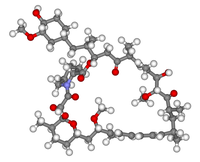
Photo from wikipedia
This special issue on mammalian target of rapamycin (mTOR) explores the importance of mTOR in cell growth control and cancer. Cancer cells often exploit mTOR as a mechanism to enhance… Click to show full abstract
This special issue on mammalian target of rapamycin (mTOR) explores the importance of mTOR in cell growth control and cancer. Cancer cells often exploit mTOR as a mechanism to enhance their capacity to grow. While protein synthesis is by far the best-characterized mTOR-driven process, this special issue also describes a wider array of mTOR-driven biological processes that cancer cells benefit from, including autophagy, cell cycle control, metabolic transformation, angiogenic signaling, and anabolic processes such as nucleotide biosynthesis and ribosomal biogenesis. Other areas of mTOR signaling covered in these reviews delve into cell migration, inflammation, and regulation of transcription factors linked to cancer progression.
Journal Title: Cancers
Year Published: 2018
Link to full text (if available)
Share on Social Media: Sign Up to like & get
recommendations!